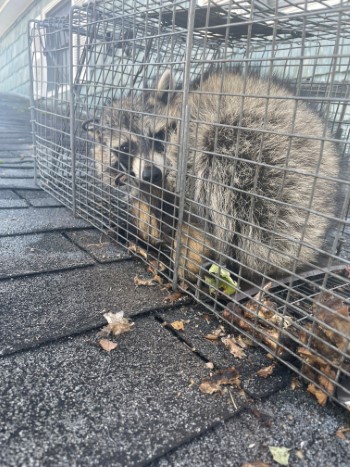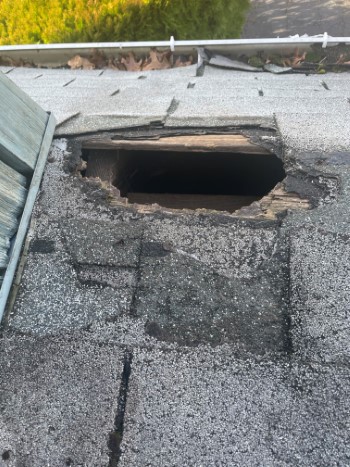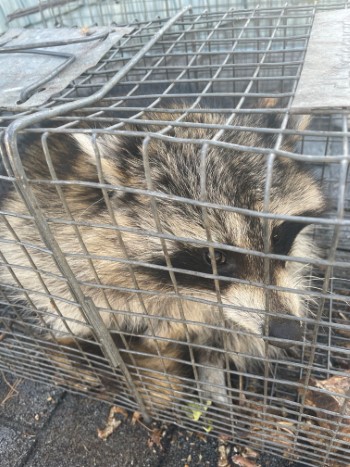
Humane Raccoon Removal Nassau County, New York
HUMANE RACCOON TRAPPING & REMOVAL
New York State Environmental Conservation Law necessitates the humane treatment of raccoons. The wildlife control operators at Nassau County Nuisance Wildlife Removal Services strictly comply with this requirement. We solve raccoon issues using a decision-making approach that balances safety concerns, humane treatment of raccoons; feasibility; landowner rights; the protection of raccoon populations and habitats; and moral, legal, financial, and aesthetic issues.
Our raccoon control program is carried out in such a way as to avoid adversely impacting any non-target wildlife species. Since our wildlife control operators are knowledgeable about the habits of raccoons and their habitat, they exercise care by avoiding wildlife control methods that may impact non-target animals and pets.
NASSAU COUNTY'S BEST RACCOON REMOVAL SERVICE
Nassau County Nuisance Wildlife Removal Services is a full-service wildlife pest control service. We are fully licensed and insured in New York State and strictly comply with all laws and regulations related to pest control and nuisance wildlife control. Nassau County Nuisance Wildlife Removal Services employs professionals who exemplify the traits of honesty, sincerity, and dedication. Our Long Island wildlife control service, treats people, property, and wildlife with respect. At Nassau County Nuisance Wildlife Removal Services, we strive to broaden our knowledge, insights, skills, and abilities to advance pest control and nuisance wildlife management practices. We offer our wildlife expertise to all Nassau County homeowners upon request, within the limits of our knowledge, experience, and legal authority. We are Nassau County's best wildlife control and pest control provider!
FAST RESPONSE
Nassau County Nuisance Wildlife Removal Services offers same-day and 24-hour emergency humane wildlife removal services. Our Nassau County wildlife removal and pest control services are fast and effective and provide the highest degree of safety for your family and pets. Our staff works hard to effectively service every customer's wildlife pest control needs and to safeguard one of their most valued investments, their Nassau County, Long Island homes.
A COMPLETE SOLUTION FOR YOUR WILDLIFE CONTROL ISSUE
Nassau County Nuisance Wildlife Removal Services is a wildlife control service that humanely removes wildlife from Nassau County homes and businesses. We are the best wildlife removal service in Nassau County, New York because we offer our customers a complete solution to their wildlife control issues. Our wildlife control service is staffed with raccoon trapping and animal control experts. The wildlife control operators at Nassau County Wildlife Removal Services will perform an initial wildlife inspection on your home or business to determine what kind of animals are inhabiting your premises. Are animals in the attic of your Long Island home or business? Are you hearing scratching or scurrying noises during the day or at night? If the sounds are in the evening, this could be rodents in the attic, and if the animal sounds are thunderous, this is most likely from raccoons in the attic. Other animals active in Nassau County, Long Island attics at night include mice, bats, opossums, rats, and flying squirrels. Sounds in the attic during the daylight hours are probably from gray squirrels or birds in the attic.
Nassau Nuisance Wildlife Removal Services animal control experts will humanely trap the raccoons that have taken up residence in the attic of your Nassau County, Long Island home or business. Our complete solution to our customer's wildlife control issues consists of wildlife entry point repairs, raccoon damage repairs, attic cleanup, and disinfecting services by Nassau County contractors who are licensed and insured. As part of our Nassau County Integrated Wildlife Pest Control Program, we will make suggestions so you can avoid future wildlife control issues and encounters with unwanted nuisance wildlife, such as squirrels, skunks, birds, mice, rats, foxes, groundhogs, bats, raccoons, and opossums. Here our wildlife control operators will be looking for what actions can be taken to prevent future wildlife control issues. For example, the raccoons in the attic may be accessing your home via an opening in the soffit. Upon completion of the raccoon removal process from your Nassau County home or business, we will put you in contact with a licensed Nassau County wildlife exclusion contractor. Another example of Integrated Wildlife Pest Management would be bats, squirrels, raccoons, or birds nesting in your home's chimney. Upon the consummation of the Long Island raccoon removal, squirrel trapping, bat removal, or bird removal, we will install a chimney cap to avert future encounters with nuisance wildlife.
GETTING RID OF RACCOONS - LONG ISLAND, NEW YORK
While looking out the window of a Nassau County residence and seeing a raccoon in the yard may be a pleasant experience for some people, they can do a lot of damage. Raccoons can damage lawns, gardens, and homes, raid chicken coops, and prey upon fish in koi ponds. Long Island residences provide the perfect refuge for raccoons and other wildlife because they afford easy access to the essential elements needed for survival: food, water, and shelter. However, there are some actions that Nassau County, Long Island homeowners can take to avert conflicts with raccoons. Once inside a Nassau County residence, raccoons are challenging to get rid of and carry wildlife diseases that can pose serious health risks. Raccoons may be infected with zoonotic diseases and harbor disease-carrying ticks and fleas. In addition to removing raccoons from attics, we also remove raccoons from chimneys, garages, sheds, basements, crawlspaces, and from beneath decks, porches, and gazebos. The cost to get rid of raccoons depends on where they are and what would be involved in removing them. Contact Nassau County Nuisance Wildlife Removal Services for a free raccoon removal price quote.
RACCOON CONTROL TIPS - NASSAU COUNTY, NEW YORK



Trash Cans - Raccoons will tear garbage bags open, so storing them in sealed trash cans with tightly fitting animal-proof lids is essential. Ideally, garbage cans should be kept in an outdoor storage shed, preventing raccoons and other wildlife from attempting to remove the covers.
Vents - Plastic and aluminum vent covers are points of entry for raccoons that will break through them and make their way into the attics of Nassau County residences.
Landscaping - Raccoons and other wildlife, including squirrels and opossums, frequently gain access to the rooftops of Long Island homes via shrubs and tree branches that contact the roof. Keeping trees and shrubs pruned is crucial to keep raccoons and other wildlife out of the attic.
Chimneys - If you have a home built or are planning to purchase an existing house, take note of where the chimney is or will be. The brickwork of masonry chimneys built onto the sides of Long Island homes functions as a ladder for raccoons, squirrels, and other vermin to climb onto the roofs and enter attics. For this reason, it would be well advised to build or purchase a home where the chimney is not built onto one of the sides of the residence.
Chimney Cap - This will exclude raccoons, squirrels, birds, and bats from making their home in your chimney and potentially ending up in your house.
Gutters - Are affixed to homes by fascia board. If leaves and debris are permitted to build up in the gutters, water will not drain out of them. Clogged gutters will result in the fascia board rotting, creating a weak point on the roof. Raccoons and squirrels will make their way through the weakened fascia board and gain entrance to the attic of a Nassau County home. Consequently, gutters must be cleaned regularly, or gutter guards need to be installed.
Decks, Sheds, And Porches - Should always have skirting around them to prevent raccoons, skunks, opossums, woodchucks, and feral cats from residing beneath them.
Clean Up the Yard - If a fruit tree is on your property, it will inevitably provide a source of food for wildlife. So, pick up fruit that has dropped to the ground.
Do Not Feed Raccoons - When people feed raccoons, the animals lose their fear of humans and will approach them expecting to be fed. If the raccoons are not fed, they may become aggressive and bite. When raccoons are consistently fed, the animals will abandon their natural food resources and lose the skills required to acquire them. Feeding raccoons can bring more raccoons into an area than would normally be there, resulting in the spread of parasites and disease.
Do Not Leave Pet Food Outdoors - It is always better to feed domestic animals indoors. If you feed feral cats, it is best to feed them in the later part of the morning or early afternoon. Always pick up the cat food, water bowls, leftovers, and spilled food each day before sundown. If you leave food out overnight, this will attract raccoons and often lead to a conflict between the raccoons and the feral cats you are feeding.
Keep Domestic Pets Indoors - Whenever possible, keep domestic pets indoors at night. If this isn't possible, ensure they are in a secure area that raccoons can't penetrate. Raccoons will attack dogs and cats when they feel threatened by them. Your pet could be infected with the rabies virus as a result of being bitten by a raccoon.
Secure Pet Doors From Raccoons - To prevent raccoons from entering your Nassau County home through a pet door, never place your pet's food or water close to the inside door. Always Lock pet doors at night. If this is not feasible, there are options for electronically operated doors activated by a collar your cat or dog wears.
Keep Compost Secure - If composting, don't create a compost pile. Instead, it should be put in a secure, animal-proof compost container or kept in a closed structure. Securing the compost keeps the raccoons from feeding on it and keeps the compost free of feces.